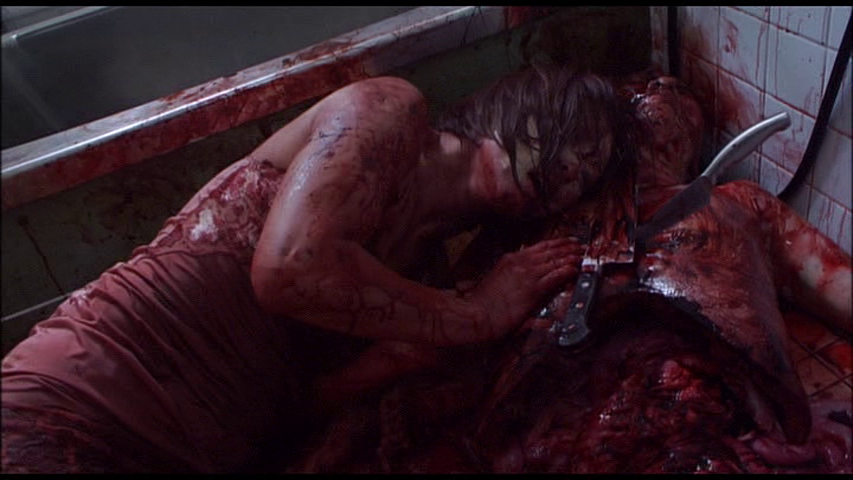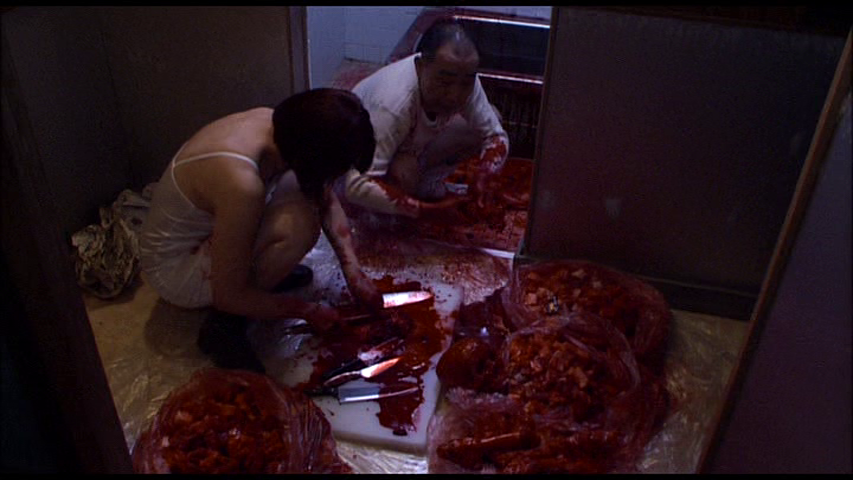Cold Fish takes the standard film story of the “innocent man drawn into crime” to its most extreme level, with all the blood and gore we might expect from the maker of Suicide Club, but with a detailed attention to character not seen in that gory predecessor.
Nobuyuki is the very typical small businessman always on the edge of failure in his small fish store. He has a pretty young second wife Taeko who is regretting her marriage and a teenaged daughter Mitsuko who hates her step-mother and can’t wait to get away from her home. Mitsuko is caught shop-lifting, and when the parents come to the store, a stranger barges in on the meeting with the manager, gets charges dropped, and even offers Mitsuko a job and a place to live. Murata has a gigantic tropical fish store, and is the most affable and out-going of men, the kind of man who just sweeps away opposition with his joviality. But he is so open and friendly that we just know that there is something wicked going on, and sure enough there is.
Nobuyuki comes to check on his daughter, who seems already brainwashed along with the six other strange girls in the shop.
They all live in a dorm and work in very short shorts, but if there is something sexual going on as a sideline to Murata’s business, we never see it. Instead, Nobuyuki is brought into the middle of a business deal, simply to sit there and give the investor confidence that everything is legit. As soon as the man hands over the cash, he is poisoned, and Nobuyuki is forced to drive Murata, his wife Aiko, and the body to a cabin/Christian shrine in the hills, where the couple dismember the body, burn the bones, and feed the pieces of flesh to the fish in a river. Murata prides himself on making his victims “invisible,” and threatens to do the same with Nobuyuki’s daughter if he says anything about it.
Murata claims he has already made 58 people invisible, and as we might expect, there are more to come. Eventually, one victim is their lawyer, who wants Aiko and all of the money, and Nobuyuki is forced to be a real accomplice in disposing of the bodies of the lawyer and his driver.
As movie tradition requires, the worm eventually turns, but the result is not just going to the police. This is, after all, a Sion Sono film, so we have a real bloodbath to bring it all to an end.  Fans of Sono, Miike, Ishii, and similar movie-makers will have no reason to feel disappointed. The Grand Guignol aspects of the story are given more than their due, underlined at times with the Funeral March from Mahler’s first symphony with great effect.
Fans of Sono, Miike, Ishii, and similar movie-makers will have no reason to feel disappointed. The Grand Guignol aspects of the story are given more than their due, underlined at times with the Funeral March from Mahler’s first symphony with great effect.
And yet, the movie is more than just an exercise in extreme gore. The audience sees everything from Noboyuki’s viewpoint and is just as confused and leery as he is as things quickly develop beyond his control. As Nobuyuki, Mitsuru Fukikoshi is the very essence of the man who has tried to do all the right things and whose life has still gone wrong. He is not looking for an escape, so he doesn’t join in with Murata intentionally. Rather, he is simply swept along in confusion, always one step behind, in love with his family yet aware that he can’t fix things with them, no matter what he does. Even so, once he snaps, he shows a ferociousness that even he did not know was there.
Denden, another long-time character actor usually in the background, plays Murata as a man who also doesn’t know himself. His nice guy pose is rather over-powering, so much so that we suspect from his first appearance that something odd is going to happen, yet it seems to not be a pose. There also seems to be no plan for Nobuyuki – they never met before and Murata seems to really only be shopping in the store when the shoplifting occurs. Only the first murder seems to be planned, and everything after that seems to be ad-libbed, with confidence that since he has always destroyed the evidence he will always get away with his crimes. Yet he can turn on a dime, so to speak, and become angry and violent without warning, at least to Nobuyuki. Aiko, played by Asuka Kurosawa, is more complex and perhaps more deranged; she calmly reads a magazine while the investor dies, sings along with Murata as they cut up the bodies, makes a lesbian pass to one of the girls, and uses sex as a lure for both Nobuyuki and the lawyer, who apparently dies while having sex with her. Sex and violence are deeply intertwined throughout the movie, one never shown without the other.
The cabin in the woods is a very unexpected hideout, topped by a cross and filled with statues of the Virgin Mary surrounded by candles. Murata’s father lived there and apparently tortured the boy, though we are shown no actual flashbacks, but how the Catholicism is supposed to fit in with his criminality remains a mystery. Nevertheless, before he dismembers a body, he insists that all the altar candles be lit (which Aiko does with a blowtorch).
Japan was not known for serial killers, so movies based on real cases such as Vengeance is Mine and Live Today are few. The case of Gen Sekine and his wife, on which the movie was based, was a media sensation in 1993 but was old news by the time Sono turned his attention to it. Though the reason for each of Murata’s killings may vary, for he has not always killed for money; he has no consistent MO for the killings, but he definitely has an MO for afterwards. The bodies are cut into tiny pieces, so there is no chance of their discovery or identification if found. Sono rather surprisingly doesn’t actually show the dismemberment, preferring to show Murata and Aiko already covered in blood as they work among and gather up the little pieces. The bones are burned (after being anointed with soy sauce) and the ashes are scattered in a different place than the river into which the flesh is thrown. This MO seems important not just because it makes the victims invisible, but because it satisfies some part of his injured psyche, a factor that does not seem to have been part of the original case. Aiko, however, seems to join in purely for fun. In a post-film interview, Sono says he did not intend to make a comedy but it kept happening, but most of the supposed comedy missed me, at least. Nevertheless, it is an always fascinating and even suspenseful look at the serial killer.
The bones are burned (after being anointed with soy sauce) and the ashes are scattered in a different place than the river into which the flesh is thrown. This MO seems important not just because it makes the victims invisible, but because it satisfies some part of his injured psyche, a factor that does not seem to have been part of the original case. Aiko, however, seems to join in purely for fun. In a post-film interview, Sono says he did not intend to make a comedy but it kept happening, but most of the supposed comedy missed me, at least. Nevertheless, it is an always fascinating and even suspenseful look at the serial killer.



